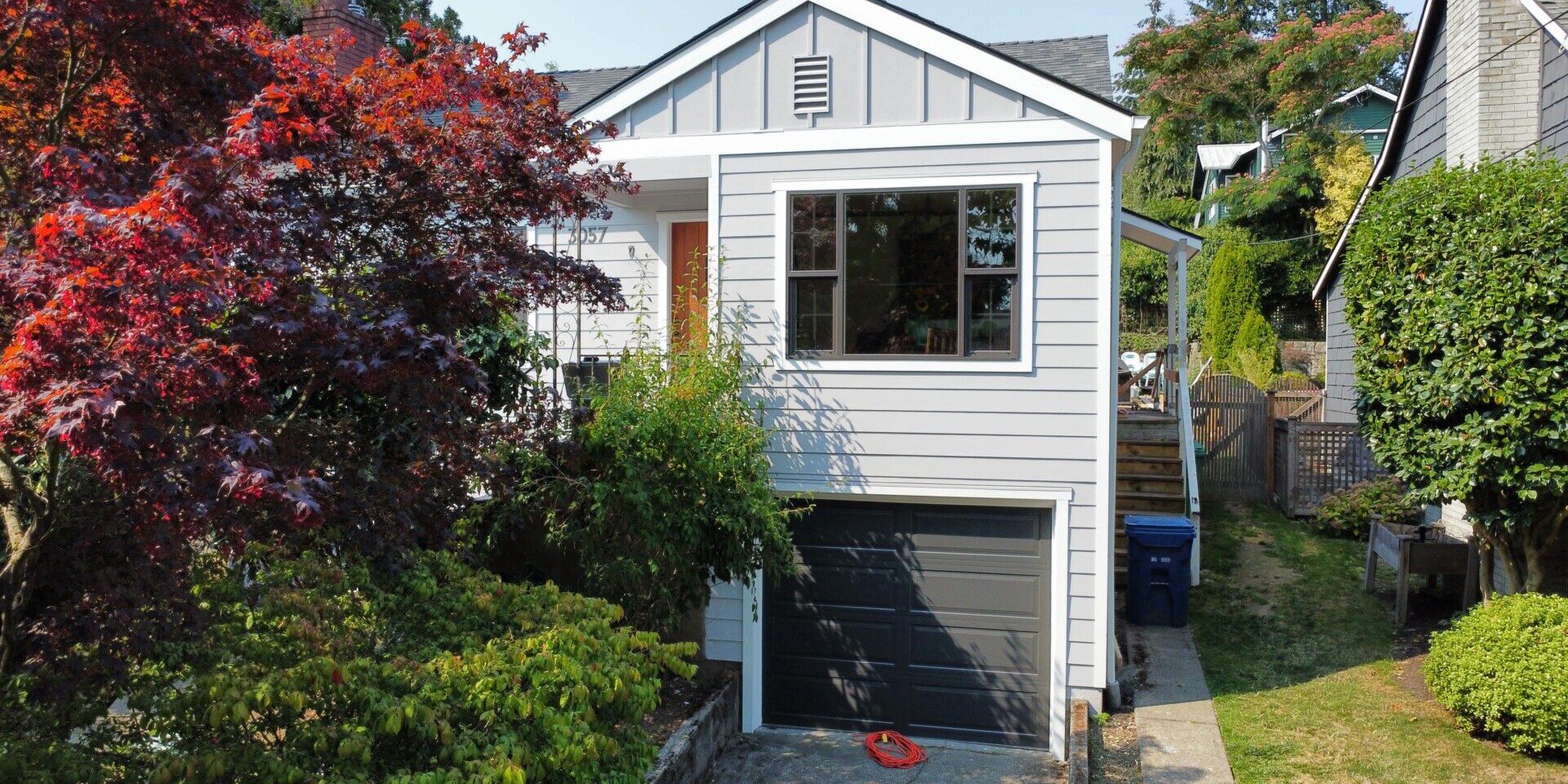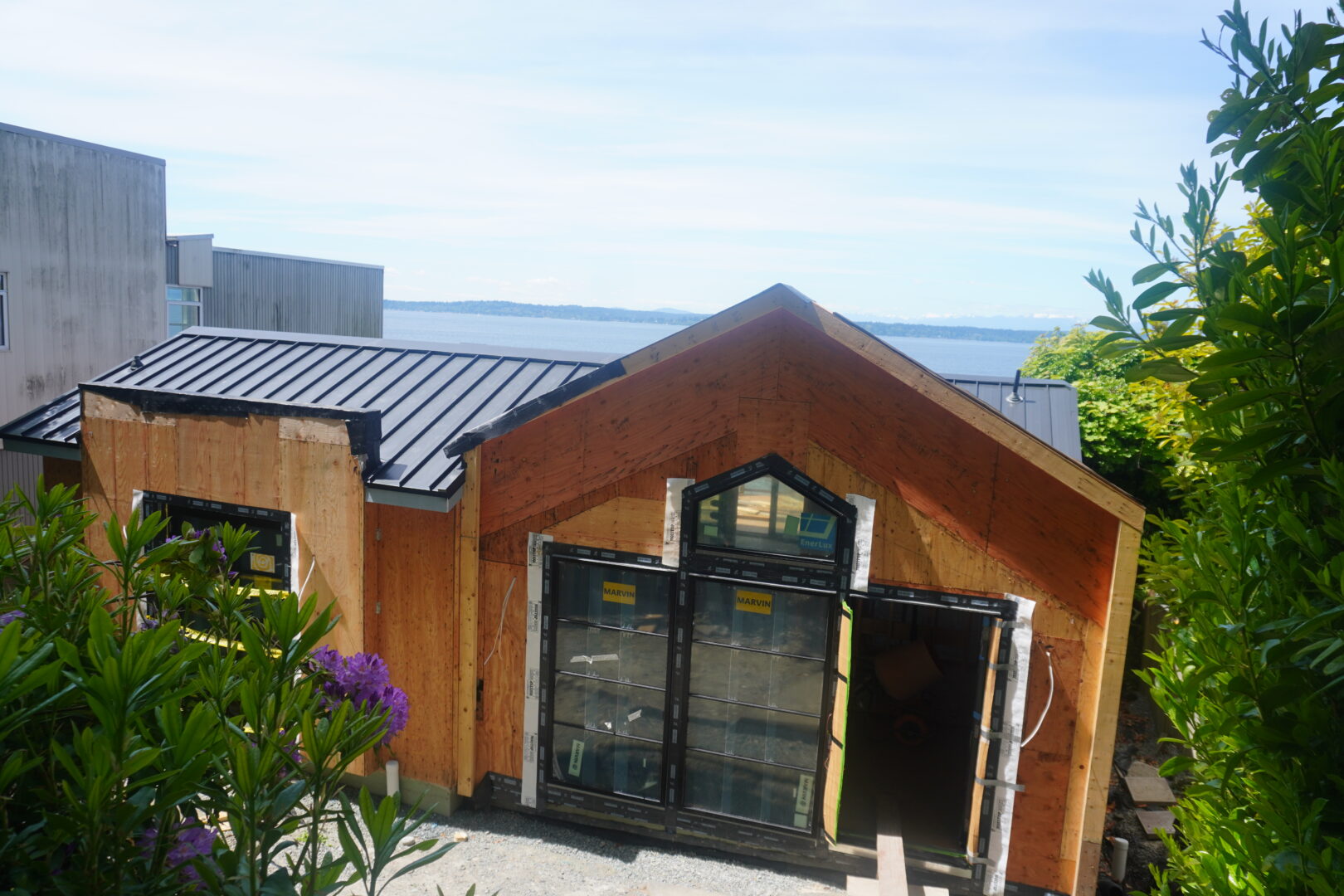How Much Does Roof Replacement Cost?
How Much Does Roof Replacement Cost?
By K Single Corp Roofing & General Contractor
A reliable roof is one of the most critical investments you can make in your home. It safeguards your property from the elements, preserves structural integrity, and contributes to your personal style and resale value.
Yet one of the most common questions homeowners ask is, “How much does a roof replacement cost?” Unfortunately, the answer isn’t one-size-fits-all.
Costs vary widely based on a range of factors, from the type of roofing material you choose to the complexity of your roof’s design. Let’s break down the key elements that influence roof replacement costs and help you get a clearer picture of what you can expect.
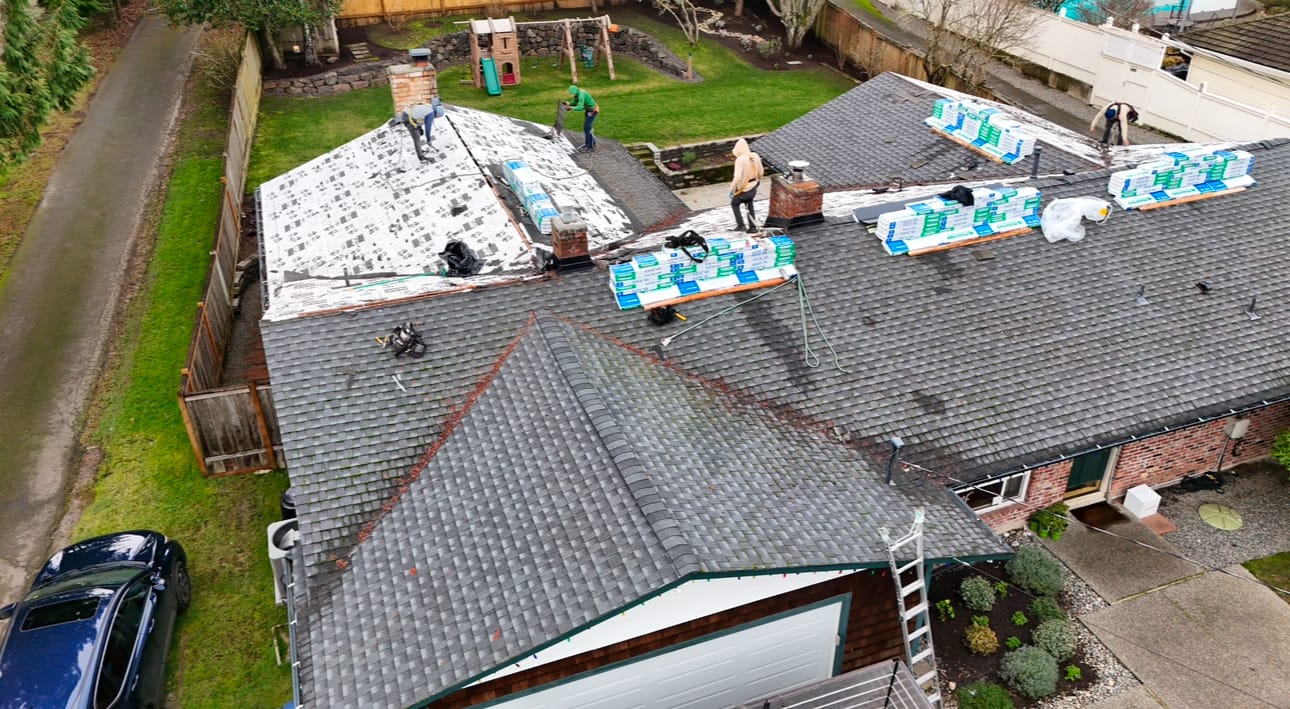
7 Factors That Affect Roof Replacement Costs
1. Roof Size and Pitch
One of the most significant factors that affect the price of a roof replacement is the square footage. Larger roofs require more materials and labor, resulting in higher overall costs. The pitch, or steepness, of your roof also plays a role.
Steeper roofs can be more challenging, and potentially riskier, for contractors to work on, which can increase labor costs. In some cases, special safety equipment or additional time may be necessary, further driving up the price.
2. Material Selection
Roofing materials vary considerably in cost, lifespan, and aesthetics. For example, asphalt shingles are often more budget-friendly, while metal or slate roofs may require a bigger initial investment but offer greater durability.
Here’s a quick overview of common roofing materials:
- Asphalt shingles: Typically the most cost-effective and historically common option, with a lifespan of 20–30 years.
- Metal roofing: More expensive upfront but long-lasting, often 50 to 70 years or more.
- Flat roofing: Common in modern or commercial buildings, flat roofs can last 30 to 70 years. They can be economical but require careful installation and regular maintenance to avoid water pooling.
- Cedar shake roofing: A classic, rustic option made from natural wood. While it generally lasts 20 to 30 years, it requires more maintenance than other options and comes with a higher upfront cost.
Choosing the right material often means striking a balance between budget, aesthetics, and durability.
3. Tear-Off vs. Overlay
If you already have a roof in place, one decision you might face is whether to do a full tear-off or simply overlay a new roof on top of the existing one.
While a tear-off is usually more expensive because it involves removing the old roof and disposing of the debris, it allows roofers to inspect the underlying structure for hidden damage. An overlay can be cheaper initially, but any underlying problems remain unaddressed, which may cost more in the long run if issues arise later.
4. Regional Labor and Material Costs
Labor and material costs can vary widely depending on where you live. For example, urban areas often have higher labor rates, while rural regions might see increased material costs due to transportation and logistics. Local demand for roofing services, especially after storms, can also affect pricing.
5. Permits and Code Requirements
Most municipalities require permits for roof replacements. The cost of permits can vary from one area to another and may depend on factors like the home’s square footage or local building codes. If your roof project must meet additional requirements, such as higher wind or fire ratings, it can add to the overall expense.
6. Complex Roof Design
If your roof has a complex design, such as multiple peaks, dormers, or skylights, expect the cost to be higher. More intricate designs can make installation more time-consuming and require specialized materials. This added labor and material use will inevitably increase your total bill.
7. Extra Features and Upgrades
Some homeowners use the occasion of a roof replacement to upgrade their current system with additions like ventilation systems or new gutters. While these enhancements can improve your home’s performance and possibly save money in the long run, they do increase the upfront cost of the project.
Typical Cost Ranges
Costs can fluctuate based on the factors mentioned above, but here’s a general idea of what you might expect for different types of roofing materials, which include the cost of materials and labor:
- Asphalt shingles: Range from $350 to $550 per 100 square feet.
- Metal roofing: Ranges from $600 to $1,900+ per 100 square feet, depending on the type of metal and complexity.
- Flat roofing: Ranges from $350 to $600 per 100 square feet, depending on the membrane type and installation requirements.
- Cedar shake roofing: Ranges from $600 to $900 per 100 square feet, depending on the quality of wood and level of maintenance needed.
Keep in mind these numbers represent ballpark estimates. Your actual costs could be higher or lower based on local market conditions, the contractor’s expertise, and your home’s unique needs.
When evaluating roof replacement costs, it’s easy to fixate on the price tag. However, value is a broader concept that considers factors like longevity, durability, and potential energy savings. Spending more on a pricier roof upfront might lead to lower maintenance costs and a longer lifespan overtime.

Financing and Insurance Considerations
Roofers don’t expect you to have the money for a roof replacement up front. Luckily, there are options to help you afford this costly project.
Financing Options
Many homeowners explore financing for roof replacement through home equity loans, personal loans, or specialized roofing financing plans offered by contractors. Before choosing a financing route, think about interest rates, loan terms, and your own cash flow to ensure you’re making the right financial decision.
Insurance Coverage
If your roof has been damaged by a covered event, such as hail, wind, or a fallen tree, your homeowner’s insurance might cover all or part of the replacement. Review your policy and consult with your insurance provider to clarify what’s included.
Choosing the Right Roofing Contractor
A significant piece of the cost equation is the quality of workmanship. Hiring a reputable roofing contractor ensures your roof is installed correctly, preventing leaks, early failures, and potential structural issues. Look for a contractor with:
Look for a contractor with a proven track record in your area, valid licenses and insurance to protect both parties, and strong references from past clients. A reliable roofing professional should also provide a clear, itemized estimate that explains labor costs, materials, and any additional fees.
In Need of a Roof Replacement? Schedule Your FREE Estimate With K Single Corp Today
Contact K Single Corp for a FREE estimate. Our experienced team will assess your roof’s condition, discuss material options, and provide a transparent breakdown of costs. We’ll also answer any questions you may have about financing, insurance claims, or the installation process so you can make a well-informed decision.
Installing a Metal Roof: What Homeowners Need to Know
Installing a Metal Roof: What Homeowners Need to Know
By K Single Corp Roofing & General Contractor
A roof is one of the most critical investments you can make for your home. It protects against the elements, contributes significantly to curb appeal, and can even impact energy efficiency. While asphalt shingles remain a popular and traditional choice, metal roofing has gained notable traction in recent years.
Homeowners are increasingly turning to metal roofs for the promise of longevity, eco-friendliness, and significant potential cost savings over time. This guide will walk you through the key considerations of metal roofing, including its benefits, potential pitfalls, and what you should know before making the switch.

7 Reasons To Choose Metal Roofing
If you’re looking for a roofing option that looks great, lasts for decades, and helps reduce monthly utility bills, metal might be the perfect option for you.
Let’s break down some of the most compelling reasons homeowners choose metal roofing.
1. Energy Efficiency
One of the primary advantages of metal roofing is its exceptional energy efficiency. Interestingly, both light and dark metal surfaces can reflect a significant portion of the sun’s heat.
This means that during the summer, your home will absorb less heat and stay cooler, potentially cutting down on air conditioning costs. In the winter, metal roofs with proper insulation can help retain heat, easing the burden on your heating system. Over time, these energy savings can make a noticeable difference in your monthly bills.
2. Sustainability
Sustainability is another major benefit that sets metal roofing apart from many other materials on the market. Typically made from 30-60% recycled materials, metal roofs themselves are 100% recyclable once they’ve reached the end of their long service life.
By choosing a metal roof, you’re diverting recyclable materials from landfills and investing in an eco-friendly option that reduces environmental impact.
3. Durability
Durability is another hallmark of metal roofing. These roofs are built to withstand a range of extreme weather conditions, from high winds to heavy rain, hail, and even fire.
Thanks to their sturdy composition, metal roofs are naturally resistant to moss and mildew growth, minimizing the need for frequent cleanings or treatments. If you live in an area prone to severe storms or high humidity, this added durability can provide a reassuring layer of protection for your home.
4. Rust Resistance
Worried about your metal roof rusting over time? Modern steel roofing often features a metallic coating composed of zinc or a zinc-aluminum mixture.
This coating is applied during the fabrication process and serves as a robust barrier against rust. Choosing a quality product with this protective layer is crucial for maximizing the roof’s lifespan and ensuring that rust is kept at bay.
5. Lifespan
While installing a metal roof can have a higher upfront cost, its longevity often justifies the investment. Many metal roofing products come with manufacturer warranties ranging from 30 to 50 years, and some well-maintained metal roofs have even been known to last up to 70 years.
This translates to significantly fewer roof replacements over the lifetime of your home, saving you time, hassle, and money in the long run.
6. High Return on Investment (ROI)
When it comes to return on investment (ROI), a metal roof typically delivers. Its long lifespan and durability often mean fewer repairs and replacements, which could reduce long-term costs.
Additionally, you may see a decrease in homeowner’s insurance premiums, because some insurance companies offer discounts to homes with metal roofs due to their performance in harsh weather. If you plan to sell your home in the future, a high-quality metal roof can be a strong selling point, attracting buyers who value energy efficiency and longevity.
7. Solar Panel Compatibility
With rising interest in renewable energy, many homeowners consider adding solar panels to reduce their carbon footprint and utility costs.
Metal roofs are well-suited for solar panel installation. Their energy efficiency pairs seamlessly with solar technology, and their long lifespan means you won’t have to remove and reinstall panels prematurely.
Common Misconceptions About Metal Roofs
Despite its growing popularity, metal roofing still faces some persistent myths. Let’s tackle a few of the most frequently asked questions.
Are Metal Roofs Noisy?
Many people worry that a metal roof will sound like a drum during rainstorms or hail. However, when installed correctly with solid sheathing, proper insulation, and adequate attic ventilation, a metal roof is no noisier than more traditional roofing options. In some cases, homeowners even report that their metal roofs help dampen exterior noise.
Do Metal Roofs Attract Lightning?
No. Metal roofs are no more likely to be hit by lightning than any other type of roofing material. As mentioned earlier, metal’s conductivity can actually improve the safety of your home during an electrical storm, as it distributes the charge rather than concentrating it in one spot.
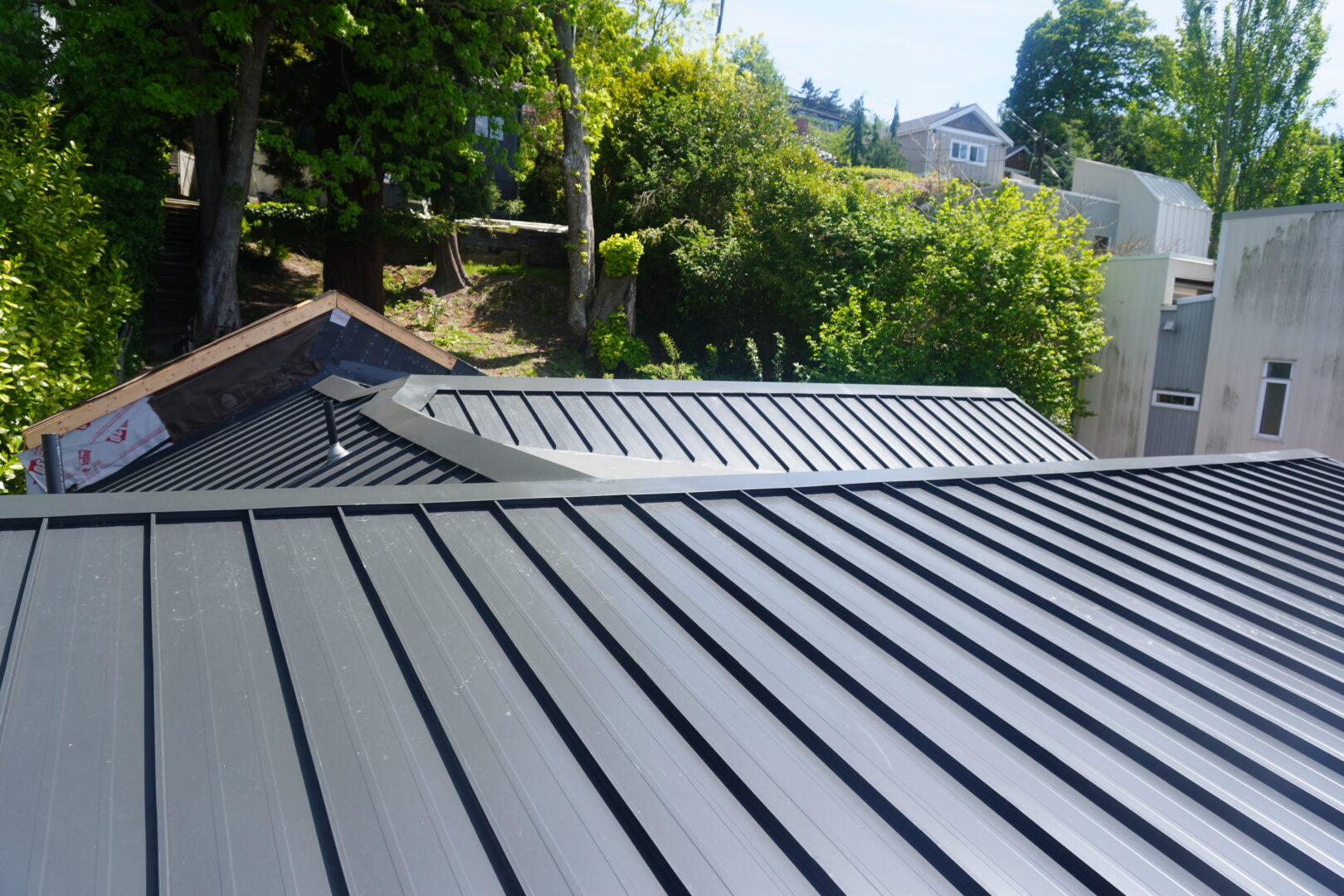
Potential Pitfalls and How to Avoid Them
While metal roofing delivers numerous advantages, it’s not entirely free of challenges. Here are the key pitfalls to watch out for and how you can prevent them:
Initial Cost
Metal roofs often cost more upfront than traditional shingles, but their durability and minimal maintenance can offset the expense over time. Consider your long-term savings on repairs, replacements, and energy bills when weighing this investment.
Poor Installation
Improper installation causes most metal roof problems, from leaks and noise to reduced efficiency. Choose a contractor with proven metal roofing experience to ensure proper sealing, secure fasteners, and adequate sheathing.
Corrosion and Leaks
Modern metal roofs are rust-resistant, but damage to the protective coating can leave steel vulnerable to corrosion. Regularly inspect for scratches or nicks, especially after severe weather, and address them promptly to keep your roof in top condition.
Find a Roofing Contractor Near You
When it comes to metal roofing, selecting the right professional is essential. An experienced contractor will understand the nuances of metal roof installation, from underlayment types and fastening systems to ventilation requirements.
They can also guide you in selecting the right metal and coating for your region’s climate. A dependable contractor will ensure you get the most out of your investment and help you avoid common pitfalls such as leaks, corrosion, or noise issues.
Interested In a Metal Roof? Schedule Your FREE Estimate With K Single Corp Today
Call K Single Corp Roofing & General Contractor today to learn more about installing a metal roof. Our experienced team will walk you through the entire process, from choosing the right metal type to ensuring a high-quality, long-lasting installation. You’ll have the peace of mind that your roof is secure, durable, and perfectly suited to your home’s needs.
Benefits of Asphalt Shingle Roofing: Affordability, Durability, and Versatility
Benefits of Asphalt Shingle Roofing: Affordability, Durability, and Versatility
By K Single Corp Roofing & General Contractor
When it comes to roofing materials, homeowners have more choices than ever. Metal, tile, wood shakes, and even rubber are among the many options available. However, for decades, asphalt shingle roofing has remained the most popular and widely used roofing material in North America, and for good reason.
If a worn-out roof needs replacing or a new home is on the horizon, asphalt shingles might be a good choice. In this blog post, we’ll examine the primary benefits of asphalt shingle roofing and explain why it could be the best fit for your project.
Affordability
Few roofing materials can match the budget-friendly nature of asphalt shingles, making them an excellent choice for both cost-conscious homeowners and those looking for overall value.
Upfront Affordability
When it comes to roof replacement or new construction, affordability is often a top consideration for homeowners. Compared to others, asphalt shingles consistently stand out as one of the most cost-effective options on the market. They generally have lower production and installation costs compared to other roofing materials, such as slate, metal, or tile.
Because of their widespread availability, asphalt shingles can also save on transportation costs, further lowering the overall price for homeowners. For budget-conscious property owners, asphalt shingles offer an excellent balance between low upfront cost and high value in the long run.
Low Maintenance and Repair Costs
One of the hidden savings that come with asphalt shingle roofing is the relative ease and affordability of maintenance and repairs. Minor issues like cracked or missing shingles are typically straightforward fixes and can be done on a per-shingle basis.
This can save homeowners significant amounts of money over time, as you often don’t need to replace large sections of the roof to address small problems. In addition, routine inspections and simple cleaning can keep your asphalt shingle roof in top shape for many years without major expense.
Long-Term Investment
While cost-effectiveness might bring to mind short-term savings, asphalt shingles can also be a smart long-term investment, provided they are properly installed and maintained. Many asphalt shingle products are designed with warranties that can range from 20 to 50 years, depending on the manufacturer and specific line of shingles chosen.
When you calculate the combination of affordability, ease of maintenance, and respectable lifespan, the return on investment for asphalt shingle roofing can be impressive.
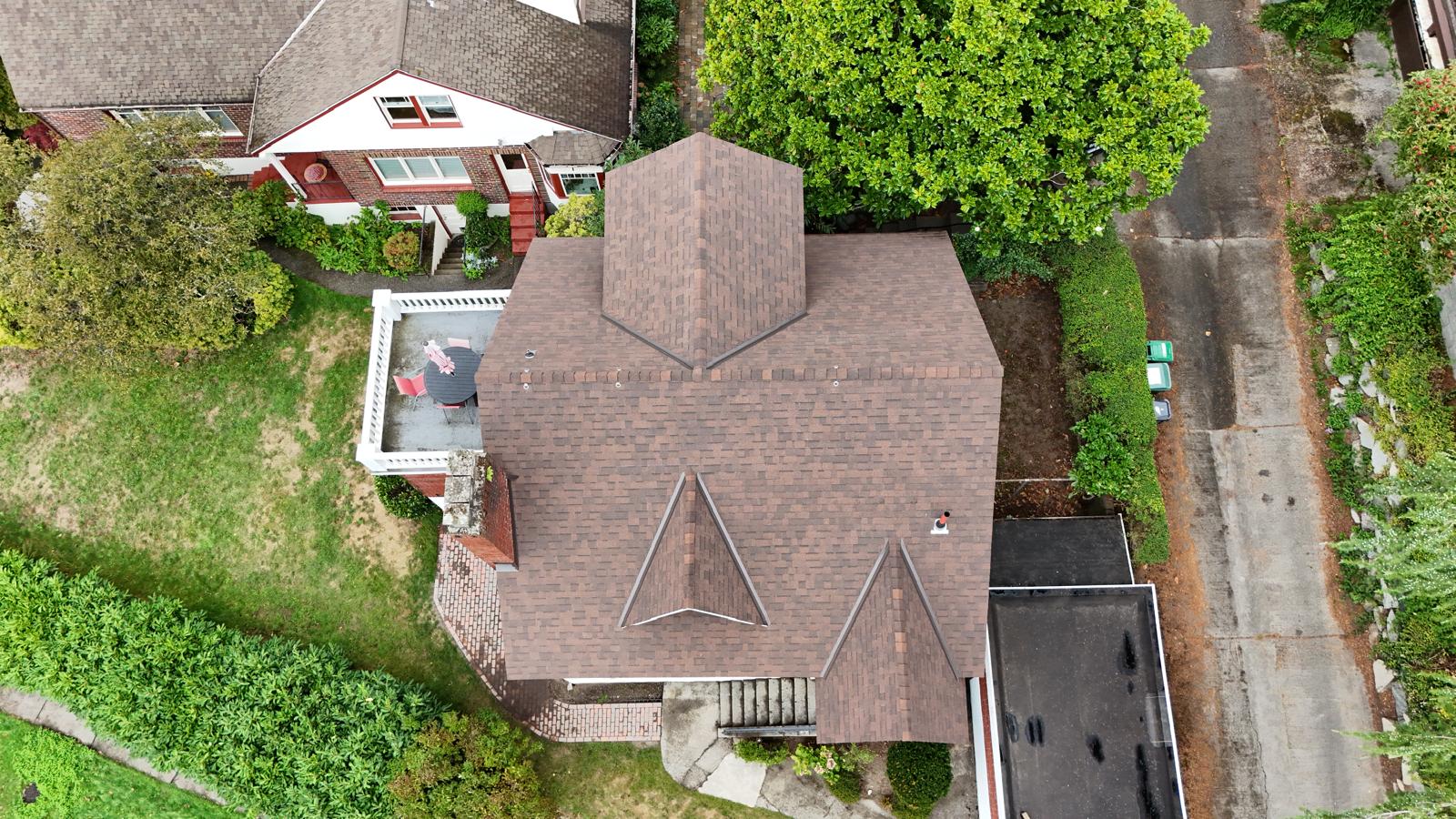
Durability
While cost is essential, a roof’s ability to withstand weather extremes and protect your home year-round is equally crucial. That’s where asphalt shingles shine.
Resistance to Weather Extremes
Durability is another key reason why asphalt shingles have remained so popular. The best asphalt shingle products are engineered to withstand a wide range of weather conditions, from scorching sun to heavy rain and high winds. This resilience makes them particularly suitable for areas that experience harsh or unpredictable weather patterns.
In addition, specialized shingles, often called architectural or laminated shingles, offer enhanced durability. These shingles feature extra layers or improved composition that provide even greater protection against wind and impact damage.
Preventing Leaks and Water Damage
A sturdy roof protects your home from more than just outside elements; it guards against interior structural damage, too. Asphalt shingles are designed to create a protective barrier that channels water off the roof, into the gutters, and away from your home’s foundation.
When installed correctly with quality underlayment and flashing, they do an excellent job of minimizing the risk of leaks, mold growth, and costly structural issues. Water damage can be one of the most expensive and frustrating home repairs, so a reliable roof is crucial for any homeowner.
Modern Manufacturing for Extended Lifespans
Thanks to significant advances in modern manufacturing, today’s asphalt shingles are far more durable than those of decades past. Many are constructed with fiberglass reinforcing mats, making them lighter yet stronger.
Granule technology has also improved, which helps protect the shingles from UV damage, which is a major factor in shingle deterioration over time. All of these enhancements combine to give homeowners a robust roofing material that can last for decades with minimal trouble.
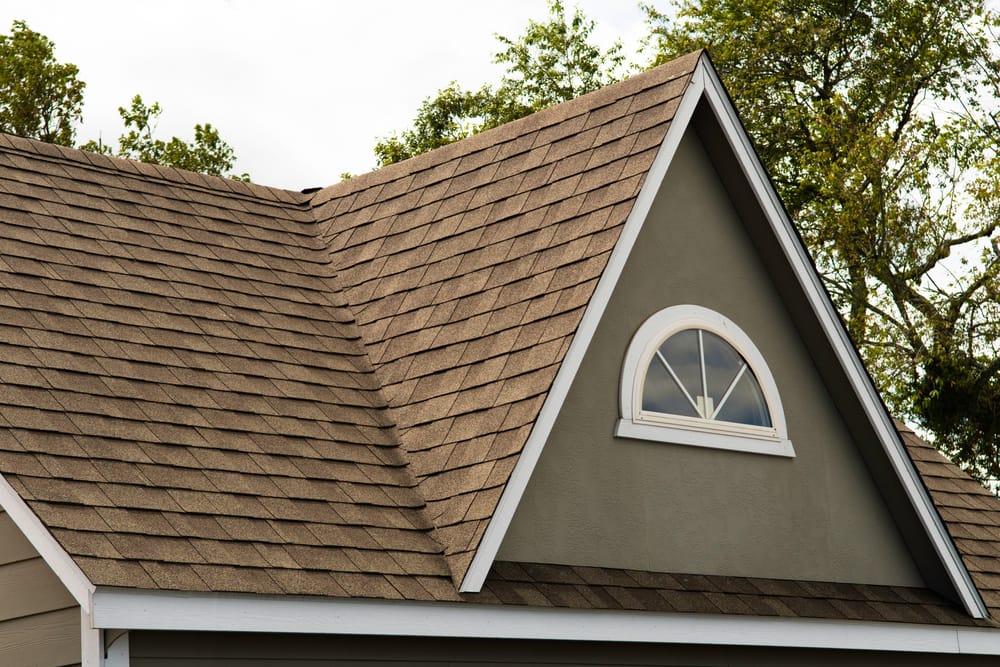
Versatility
Aside from cost and endurance, the flexible style options offered by asphalt shingles make them a universally appealing choice for a wide range of home designs.
A Wide Array of Styles and Colors
The versatility of asphalt shingles is a standout benefit. Asphalt shingles come in countless colors, textures, and styles, allowing homeowners to find an option that perfectly complements their home’s architecture and aesthetic.
Whether you want a classic, understated look or you’re trying to mimic the appearance of expensive materials like slate or wood shakes, there’s likely an asphalt shingle line to suit your style. This level of customization makes it easy for homeowners to blend their roofing choice with the broader design of their property and neighborhood.
Compatibility with Different Roof Designs
Not every house has the same roof pitch or design. Some homes have steeply sloped roofs, while others may be nearly flat or feature complex dormers, valleys, and peaks. The good news is that asphalt shingles work well with a range of roof designs.
Proper installation techniques can accommodate different pitches and shapes, ensuring your roof remains structurally sound regardless of design complexities. That flexibility is part of why asphalt shingles remain such a universal choice.
Easy Upgrades and Renovations
Since asphalt shingles are so common, finding new matching or complementary shingles for an addition or renovation project is generally straightforward. If you decide to expand your home, matching the existing shingles is often simpler and more cost-effective than with less common roofing materials.
This not only saves money but also helps you maintain a consistent design and appearance across the entire roof, which can be important for aesthetics and resale value.
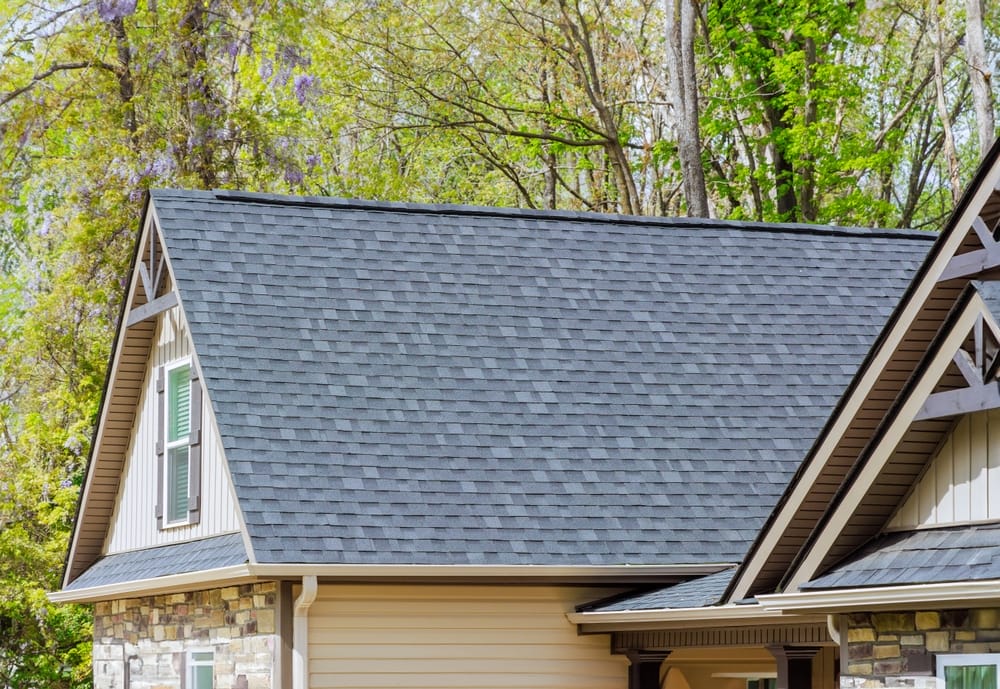
Choosing the Right Roofing Contractor
Even with the best materials, proper installation is critical for ensuring your roof’s longevity. Choosing a reputable roofing contractor with extensive experience in asphalt shingle installation can make all the difference.
Look for contractors who use quality materials, have a track record of satisfied customers, and understand local building codes and climate considerations. A trustworthy contractor will also offer warranties on both materials and labor.
Why K Single Corp Roofing & General Contractor?
If you’re in need of asphalt shingle roofing services, K Single Corp is a reliable choice. We understand the specific demands and challenges that come with roofing in our area, and our experienced team is prepared to handle projects of all sizes and complexities.
From helping you select the perfect asphalt shingles to ensuring a clean and timely installation, we provide comprehensive support every step of the way.
Looking To Install Asphalt Roofing? Schedule Your FREE Estimate With K Single Corp Today
If your roof can no longer perform at its optimal level and you’re ready to invest in a new one, call K Single Corp Roofing & General Contractor today. In a FREE estimate, we can inform you of whether a replacement is a good idea and answer any questions you may have. We look forward to hearing from you!
Types of Shingle Roofing Materials: Comparing Asphalt, Wood, and Composite Shingles
Types of Shingle Roofing Materials: Comparing Asphalt, Wood, and Composite Shingles
By K Single Corp Roofing & General Contractor
When it comes to protecting your home, few elements are as important as the roof over your head. Shingles are one of the most popular roofing materials because they’re affordable, versatile, and stylish. But the term “shingle” doesn’t refer to just one type of roofing material—there are several options available, each with its unique qualities.
This guide will walk you through the three main types of shingle roofing materials—asphalt, wood, and composite—so you can make an informed decision for your home. We’ll explore their makeup, the pros and cons of each type, and how they compare in terms of durability, cost, lifespan, weather resistance, maintenance, and overall appearance. Keep reading about all things shingle roofing.

Asphalt Shingles
What Are They?
Asphalt shingles are the most common type of roofing material in the United States. They are made from a base (usually fiberglass or organic felt) coated with asphalt, then topped with mineral granules for additional weather resistance and aesthetic appeal.
Types of Asphalt Shingles
- 3-Tab Shingles: Lightweight, flat, and uniform in design, these are the most budget-friendly asphalt shingles.
- Architectural Shingles: A thicker and more dimensional option that offers a modern look and improved durability.
- Luxury Shingles: High-end shingles designed to mimic natural materials like slate or cedar, offering premium style and performance.
Pros and Cons of Asphalt Shingles
Pros:
- Affordable: Asphalt shingles are the most cost-effective roofing material, ideal for budget-conscious homeowners.
- Variety: Asphalt shingles are available in a wide range of colors and styles to suit different home designs.
- Easy Installation: Quick to install, which can help reduce labor costs.
- Lightweight: Does not require additional structural support.
- Recyclable: Asphalt shingles can be recycled, reducing their environmental impact.
Cons:
- Durability: While durable enough for most climates, they may wear out faster in harsh weather conditions (like extreme heat or hail).
- Vulnerable to Wind Damage: Generally speaking, asphalt shingles are more susceptible to blowing off in strong storms or high winds.
- Susceptible to Cracking: Extreme cold or hot temperatures can cause asphalt shingles to become brittle, cracked, or warped.
- Aesthetic Wear: Over time, the color of asphalt shingles can fade due to sun exposure, making the roof appear worn and less attractive.
- Shorter Lifespan: Typically lasts 20–30 years, which is shorter compared to other roofing materials like metal.
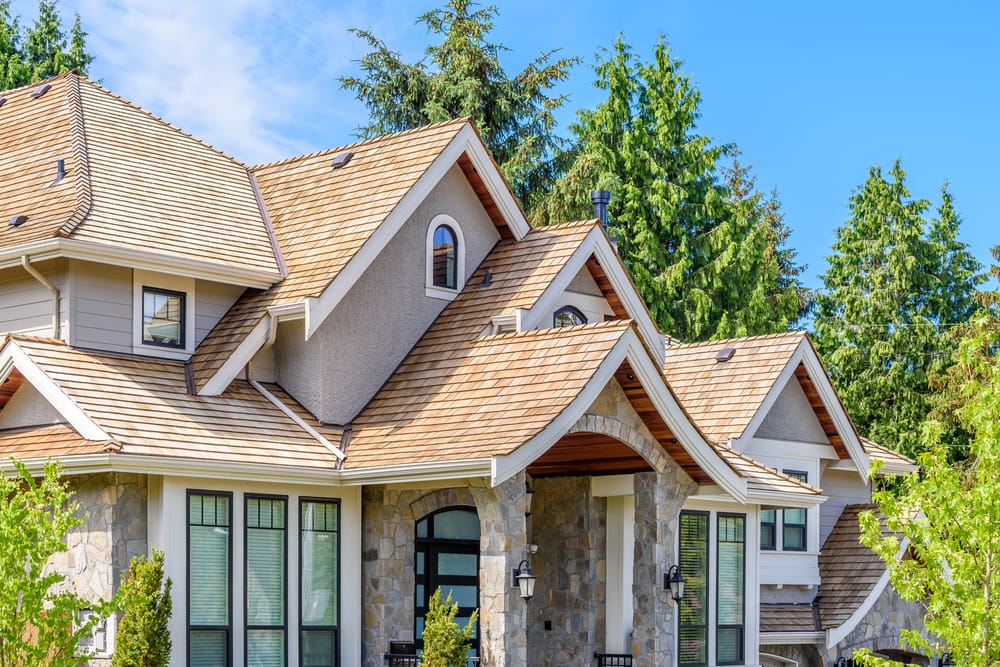
Wood Shingles
What Are They?
Wood shingles are made from natural materials like cedar, redwood, or pine. Known for their timeless and rustic appearance, wood shingles are often chosen for homes aiming for a more traditional or eco-friendly look. They can be machine-cut (for uniformity) or hand-split (for a more rugged aesthetic).
Types of Wood Shingles
- Cedar Shingles: Cedar is the most popular material due to its natural oils, which provide resistance to pests and decay.
- Redwood Shingles: Similar to cedar but with a reddish tint, they offer an equally durable and classic appearance.
Pros and Cons of Wood Shingles
Pros:
- Aesthetics: Wood shingles provide a warm, elegant and natural look that stands out from synthetic materials.
- Timeless Appeal: Wood shingles tend to age gracefully, developing a distinctive patina over time that many homeowners find appealing.
- Durability: When properly maintained, wood shingles can last 30 to 50 years or longer, depending on the wood type and climate.
- Eco-Friendly: Many wood shingles are made from sustainable sources and can be recycled at the end of their lifespan.
Insulation: Offers better thermal insulation compared to asphalt or composite shingles.
Cons:
- Cost: Typically more expensive than asphalt shingles.
- High Maintenance: Requires regular treatment to prevent moss, moisture damage, and pest infestations.
- Vulnerability to Weather: Wood shingles can be more susceptible to weathering, cracking, and splitting over time, especially in regions with extreme temperatures or high humidity.
- Potential for Mold and Mildew: If not properly treated or maintained, wood shingles can develop mold or mildew in damp conditions
- Flammability: Untreated wood shingles are more susceptible to fire, though fire-resistant options are available.
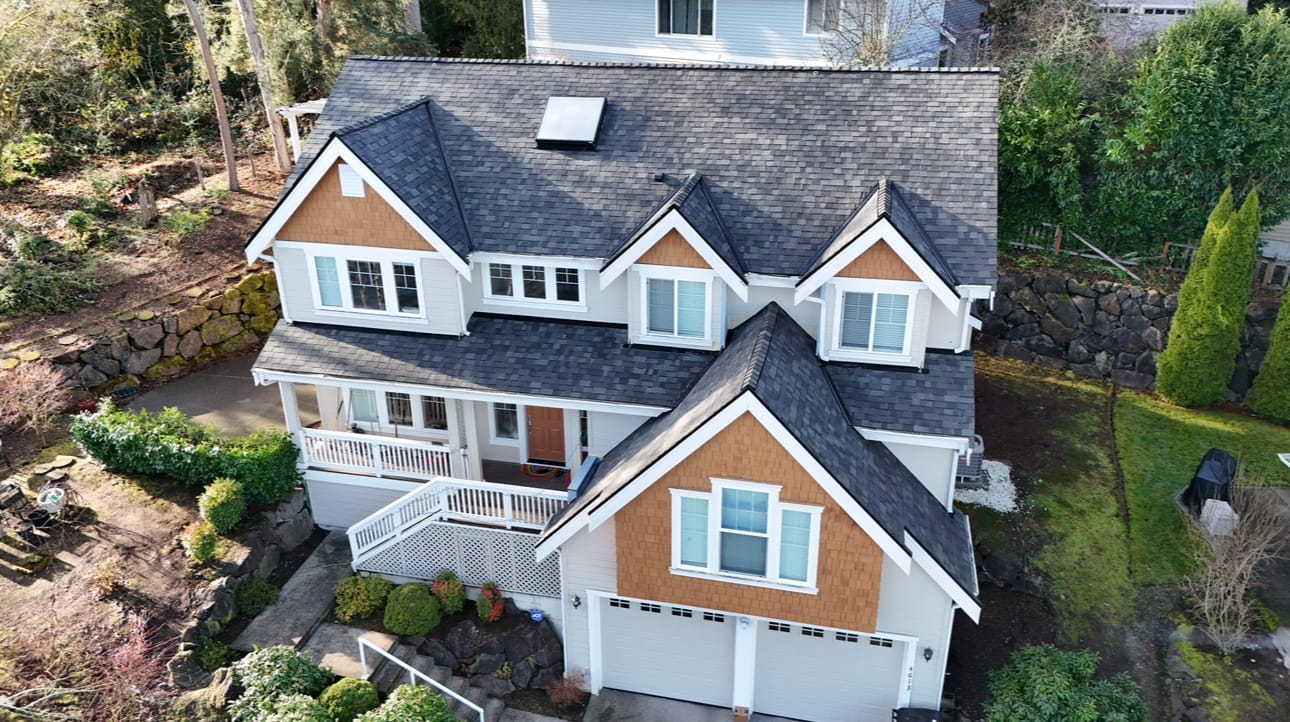
Composite Shingles
What Are They?
Composite shingles are made from a combination of materials such as recycled plastics, polymers, and fiberglass. They are designed to mimic the look of natural materials (like wood or slate) while providing added durability and lower maintenance.
Types of Composite Shingles
- Synthetic Slate Shingles: Designed to replicate the elegance of natural slate without the weight or cost.
- Synthetic Cedar Shingles: Offers the warm look of cedar wood with improved resistance to fire and decay.
Pros and Cons of Composite Shingles
Pros:
- Durability: Highly resistant to cracking, warping, mold, and mildew.
- Lightweight: Can mimic natural materials like slate without requiring structural reinforcement.
- Low Maintenance: Does not require the upkeep associated with natural materials.
- Eco-Friendly: Often made from recycled materials, contributing to a sustainable choice.
Cons:
- Cost: Generally more expensive than asphalt shingles but less costly than natural slate or wood.
- Aesthetic Limitations: While composite shingles can mimic the look of other materials (like wood or slate), they may not always match the authenticity and appeal of the real thing,
- Limited Availability: May not be as widely available as asphalt or wood shingles, depending on the region.
Comparing Asphalt, Wood, and Composite Shingles
Material Makeup & Durability
- Asphalt: Fiberglass or organic base with an asphalt coating. Durable for most weather conditions but less so in extreme environments.
- Wood: Natural materials with inherent charm but prone to moisture and pest damage without proper maintenance.
- Composite: Synthetic materials designed for maximum durability with high resistance to cracking and mold.
Cost
- Asphalt: Most budget-friendly option, ideal for homeowners seeking affordability.
- Wood: Mid-to-high price range, depending on seasoning and fire treatment.
- Composite: Higher upfront cost but offers long-term value due to durability and low maintenance.
Lifespan
- Asphalt: 20–30 years.
- Wood: 25–35 years when well-maintained.
- Composite: Often the longest lifespan, ranging from 30–50 years.
Weather Resistance
- Asphalt: Handles most climates but may degrade more quickly in extreme conditions.
- Wood: Naturally insulating but susceptible to moisture unless treated.
- Composite: Excellent weather resistance across the board, including UV and hail.
Maintenance
- Asphalt: Minimal maintenance required; periodic inspection suggested.
- Wood: Requires regular cleaning, sealing, and treatments.
- Composite: Extremely low maintenance, retaining its appearance and performance for decades.
Appearance
- Asphalt: Wide variety of colors and styles but less authentic in texture.
- Wood: Naturally beautiful with a warm, rustic appearance.
- Composite: Mimics high-end materials like slate and cedar with convincing detail and texture.
Making the Right Choice for Your Roof
Choosing the right shingle roofing material depends on your budget, aesthetic preferences, and long-term priorities. Here are some recommendations:
- If you’re looking for affordability and easy installation, asphalt shingles are a fantastic choice.
- If you value a rustic, natural look and are willing to invest in maintenance, wood shingles stand out.
- If you want durability, minimal upkeep, and high-end aesthetics, composite shingles offer the best of all worlds.
Schedule Your FREE Estimate With K Single Corp Today
Here at K Single Corp, we understand that your roof is an investment. Our experts are here to help you choose the perfect shingle for your home and budget. Contact us today for a free consultation and a tailored roofing solution!
Metal Roofing vs. Asphalt Shingles: Which Is the Better Long-Term Investment?
Metal Roofing vs. Asphalt Shingles: Which Is the Better Long-Term Investment?
By K Single Corp Roofing & General Contractor
If you’re considering replacing your roof or building a new home, you’re likely wrestling with the big question, “Metal roofing or asphalt shingles?” Both are incredibly popular options, but which offers better value in the long run? While metal is the better long-term investment, it really depends on your unique needs as a homeowner.
To help you make an informed choice, we’ll compare metal roofing and asphalt shingles across key factors like cost, durability, energy efficiency, and more. By the end of this post, you’ll have a clearer sense of which roofing material works best for your budget, durability needs, and maintenance preferences.
Let’s dive in.

What is Asphalt Shingle Roofing?
Asphalt shingles are the most widely used roofing material in the United States due to their affordability and ease of installation. They consist of a base, typically made from fiberglass or organic felt, which is coated with asphalt and finished with mineral granules. These granules not only provide added protection against the elements but also contribute to the shingles’ aesthetic appeal by offering a variety of colors and textures.

What is Metal Roofing?
Metal roofing is made from materials like steel, aluminum, copper, or zinc. These roofs are designed to provide excellent protection against the elements, offering superior resistance to harsh weather, including wind, rain, and snow. There are several styles available, including standing seam, metal shingles, and corrugated panels, each offering different aesthetic and functional benefits. Additionally, metal roofs are often coated with protective finishes to guard against rust and corrosion.
Which is Better: Asphalt Shingles or Metal Roofing?
The answer depends on your priorities as a homeowner. To help you decide, here’s a comparison across key factors:
| Asphalt Shingles | Metal Roofing | |
| Cost | Low initial cost ($100-$200 per sq.) | Higher initial cost ($300-$700 per sq.) |
| Installation | Easy to install; affordable labor | Requires specialized skills; higher labor costs |
| ROI | Asphalt shingles offer a decent return on investment for short-term homeowners who may not stay in the home for decades. Due to their affordable upfront cost, you’ll get a good amount of value for the money during your time in the home. | Metal roofing provides a higher ROI for long-term homeowners. The material’s extended lifespan (often 40-70 years or more) means that, over time, the investment pays off. |
| Durability | Asphalt shingles are moderately durable, but they can be prone to damage from extreme weather, such as high winds, hail, or heavy rain | Metal roofing offers exceptional durability and is highly resistant to most weather conditions, including high winds, hail, rain, fire, and extreme temperatures. |
| Lifespan | 15–30 years | 40–70+ years |
| Energy Efficiency | Asphalt shingles offer some insulation benefits but can absorb heat from the sun, which may increase cooling costs in warmer climates. | Metal roofs are known for their high energy efficiency, as they reflect sunlight rather than absorbing it. This reflection helps keep your home cooler, reducing the need for air conditioning in the summer. |
| Maintenance | Requires regular inspections/repairs. Asphalt shingles require regular inspections and maintenance. Over time, shingles may crack, lift, or become warped by wind, hail, or heat, requiring repair or replacement. | Metal roofs are virtually maintenance-free. Due to their durability and resistance to most weather conditions, metal roofing requires very little attention beyond occasional cleaning |
| Weather Resistance | While asphalt shingles provide some weather protection, they are still extremely susceptible to damage from weather conditions. This is important to keep in mind. | Metal roofing has excellent weather resistance and is capable of handling extreme conditions such as hail, heavy snow, strong winds, and even wildfires. |
| Environmentally Friendly | Non-recyclable; ends up in landfills | Fully recyclable; often made from eco-friendly materials |
| Appearance | Asphalt shingles come in a wide variety of styles, colors, and textures, allowing homeowners to match the roof with their home’s aesthetic. Asphalt shingles come in a wide variety of styles, colors, and textures, allowing homeowners to match the roof with their home’s aesthetic. | Metal roofs offer a modern and sleek aesthetic. |
A Comparative Look Between These Two Options
Now that you’ve seen the run-down comparison between metal and asphalt roofing based on the key factors, let’s talk about what that means for you as a homeowner.
1. Cost
If your budget is tight, asphalt shingles may feel like the better option due to their low upfront cost. However, over time, the frequent repairs and earlier replacement costs can diminish the savings. Metal roofs require a higher upfront investment, but their longevity and minimal maintenance can be more cost-effective in the long run.
2. Durability and Weather Resistance
When it comes to standing up to nature’s extremes, metal roofing takes the crown. It outperforms asphalt shingles in areas prone to strong winds, heavy rain, or hail. If durability and weather resistance are your main concerns, metal roofing is well worth the investment.
3. Lifespan
Metal roofing’s lifespan is one of its strongest selling points. While you may replace an asphalt shingle roof two or three times, a metal roof could last for the duration of your homeownership or even beyond.
4. Energy Efficiency
Metal roofing reflects heat, making it an excellent choice for keeping your home cool in the summer. Asphalt shingles, on the other hand, absorb heat—potentially increasing your energy bills. If energy efficiency is a priority, metal roofing is the way to go.
5. Maintenance
While asphalt shingles require regular inspections and occasional repairs, metal roofs are virtually maintenance-free. This makes metal roofs a go-to option for homeowners interested in hassle-free materials.
6. Sustainability and Environmental Impact
Metal roofing is the sustainable choice as it’s often made from recycled materials and is 100% recyclable. Asphalt shingles, on the other hand, contribute to increasing waste as they aren’t recyclable in most cases.
7. Appearance
Both asphalt shingles and metal roofing offer a range of styles and finishes to enhance your home’s curb appeal. Asphalt shingles can mimic traditional styles, while metal roofs can provide a sleeker, modern look.
What’s the Right Roofing Choice for You?
Ultimately, it comes down to your priorities and budget as a homeowner. What is most important to you? That you never have to worry about maintenance? Is the aesthetic appeal of your home important, and does the roof match that style? Do you need a roof that can withstand heavy snow, hail, or other extreme weather conditions in your area?
Also, think about your long-term plans. Are you in your forever home, or do you plan to move in a few years? How much time do you have for regular roof maintenance? What type of weather is common in your region? Asking these questions should help you land between the two options.
In Summary:
- Opt for asphalt shingles if you’re looking for an affordable, easy-to-install roofing option that offers a variety of styles and colors to match your home.
- Choose metal roofing if you value long-term investment, minimal maintenance, and a roof that can withstand harsh weather conditions
Let K Single Corp Guide You Toward The Best Roofing System!
Whether you’re steering towards the classic charm of asphalt shingles or the modern resilience of metal roofs, K Single Corp is here to help. Our roofing experts can guide you through the process and ensure you find the perfect roof for your home. Contact us today for a free consultation and personalized quote.
How a New Roof Can Help You Save on Energy Costs
How a New Roof Can Help You Save on Energy Costs
By K Single Corp Roofing & General Contractor
Upgrading your roof can be a headache of a project, so much so that many homeowners put it off and off until. However, it is actually a decision that could significantly impact your wallet in the long run.
The situation: many homeowners put off investing in roof replacement or repair, thinking they’re saving money. However, what often gets overlooked is how an old, inefficient roof can quietly drain your bank account with higher energy bills.
If your current roof isn’t in top shape, chances are your HVAC system has been working overtime to maintain comfortable temperatures. The result? A spike in your monthly utility bills.
So, investing in a new roofing system can actually be a great investment. Here’s a breakdown of how a new roof can help you save on energy costs, starting with why your roof plays such a crucial role in your home’s energy performance.
How Does Your Roof Affect Energy and Utility Costs?
Your roof is not just the protective umbrella over your house—it’s a critical component in regulating indoor temperatures. Here’s how your roof impacts your energy costs on a daily basis:
- Temperature Regulation: A poorly insulated roof allows heat to escape during the winter and seep in during the summer. This makes it much harder for your HVAC system to do its job effectively.
- Heat Reflection or Absorption: The surface of your roof plays a significant role in determining how much sunlight it reflects or absorbs. A roof that absorbs too much heat causes your home to feel warmer, putting extra strain on your air conditioner.
- Sealing Your Home: A well-installed roof seals the house, preventing drafts or outdoor air from sneaking in through gaps, cracks, or holes. Any breach in your roofing system can allow outdoor temperatures to creep inside, driving up energy usage.
Simply put, your roof acts as the first line of defense when it comes to your home’s energy efficiency and how hard your HVAC systems work.
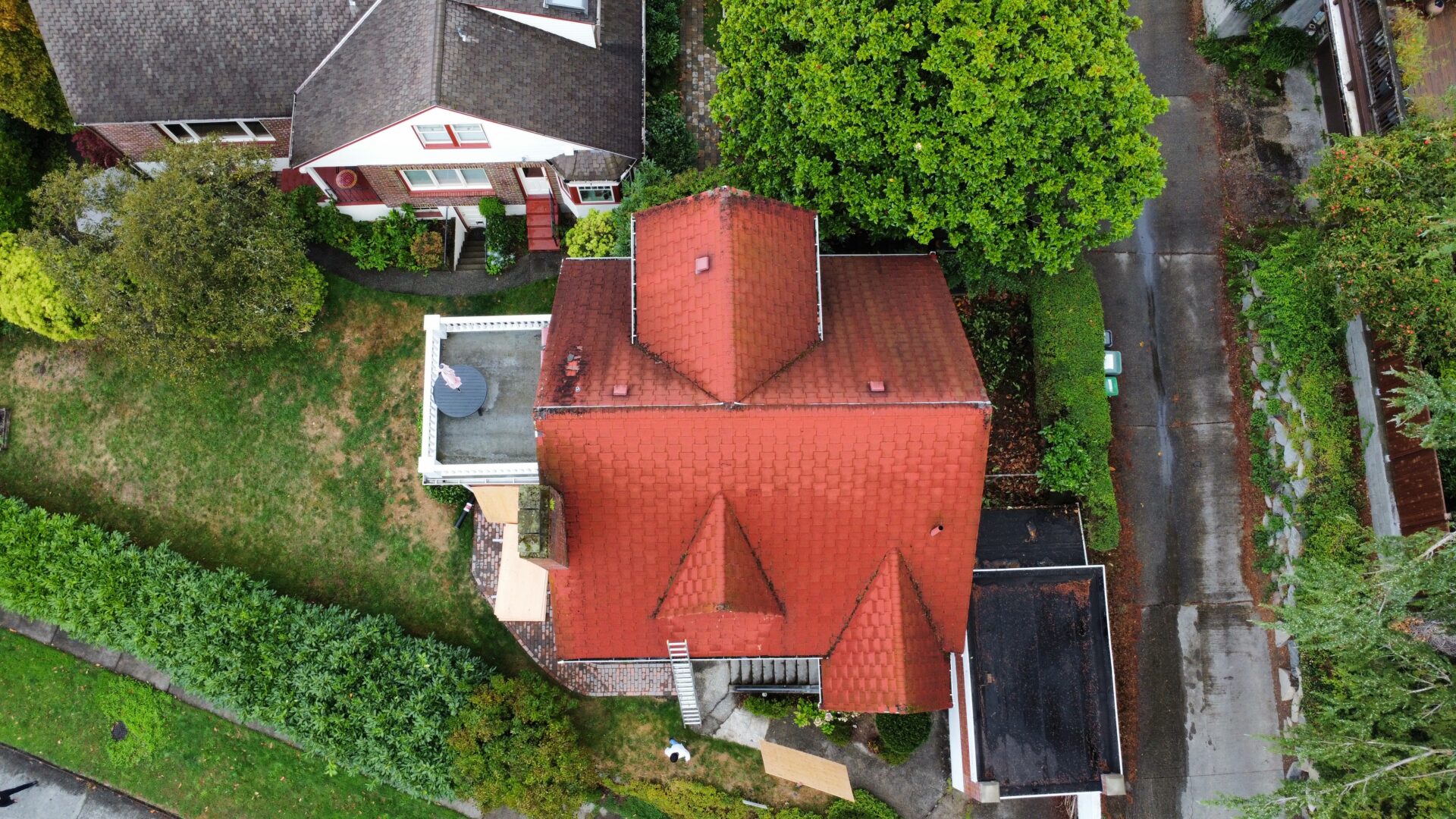
The Disadvantages of an Old Roof When it Comes to Energy Efficiency
One of the main contributors to higher energy costs is an aging or worn-out roof. Over time, string, durable roofing systems deteriorate, losing their ability to perform effectively. Here’s why old roofs often fail the energy test and wind up costing you more money than they should.
- Lack of Insulation: Older roofs often don’t have adequate insulation due to outdated building codes or materials that degrade over time. This leads to energy loss as temperatures are harder to keep consistent.
- Leaks and Gaps: Worn-out roofs are more prone to cracks, broken shingles, or missing pieces. This creates spaces where air can flow in and out, affecting your home’s ability to maintain its desired indoor temperature.
- Outdated Materials: Roofing technologies have evolved significantly over the last few decades. Older materials typically lack the energy-efficient properties of modern options, leaving your home less protected from temperature changes.
Holding on to an outdated roof may seem like a cost-saving measure at first glance, but the long-term implications for your energy bills tell a much different story.
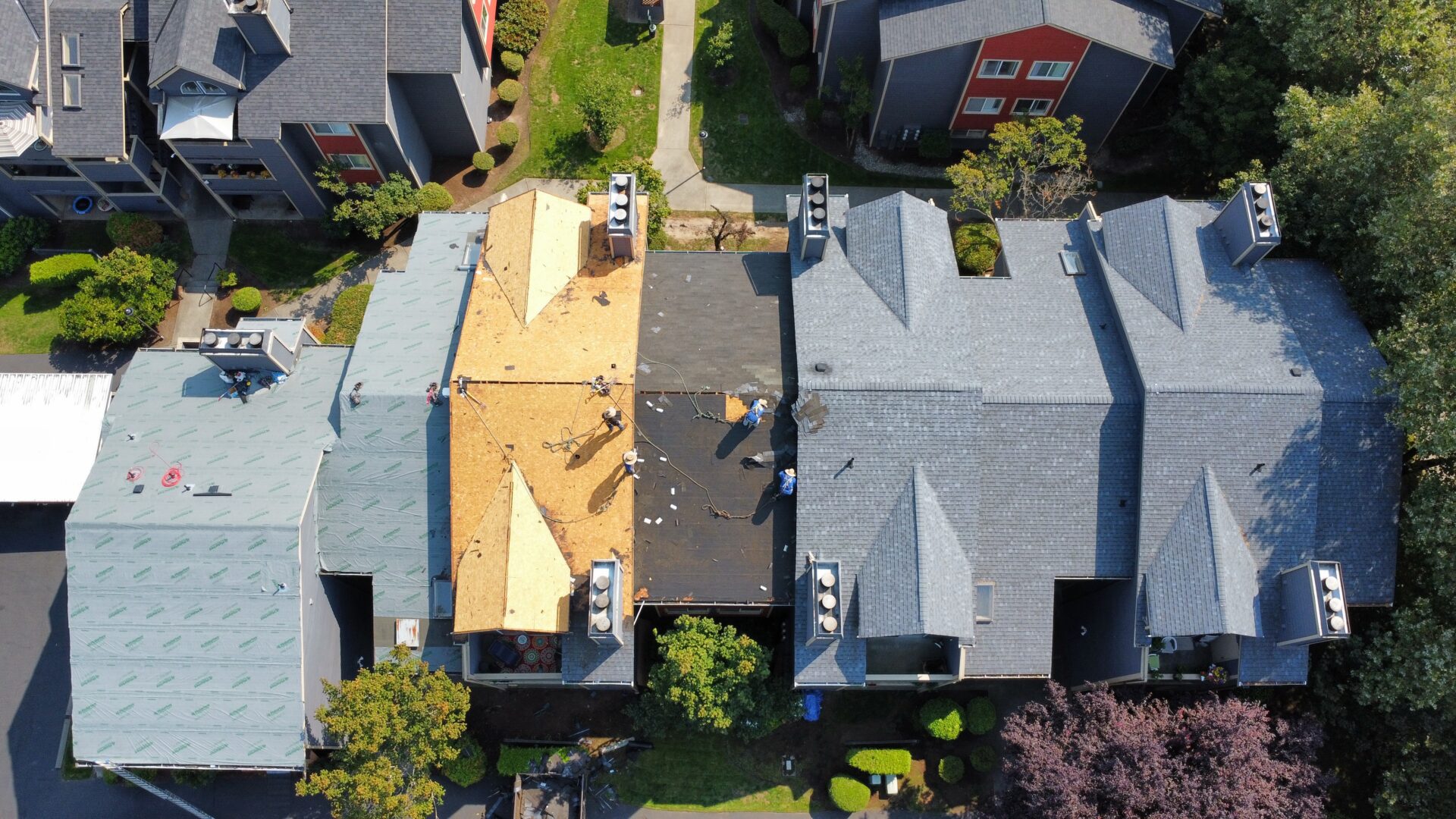
5 Ways a New Roof Can Help Cut Energy Costs
Here are five ways replacing your roof can help cut those energy costs down.
1. Solar Reflection
Many modern metal roofing systems come with reflective properties that deflect sunlight away from your home. Known as “cool roofs,” these energy-efficient options prevent heat absorption and keep your home cooler during warm months. By reducing the amount of transferred heat, your air conditioner doesn’t have to work as hard, lowering your energy consumption.
2. Improved Roof Ventilation
A new roof means improved roofing ventilation systems, which are crucial for regulating indoor temperatures and controlling moisture levels. Proper ventilation helps hot air escape from your attic during summer while retaining warmth in the winter. This reduces the energy demands placed on your heating and cooling systems.
3. Energy Star Rating
Many energy-efficient roofing materials now come with an Energy Star rating. These materials are designed specifically to reduce heat absorption, minimize energy use, and lower cooling costs. When shopping for a new roof, look for options with an Energy Star certification to ensure you’re optimizing every dollar spent.
4. Roofing Materials and Color Choices
The materials and color of your roof can have a direct impact on your energy efficiency. For instance, lighter colors, like white, light gray, or beige, reflect more sunlight than dark colors, helping to reduce heat buildup inside the house during the summer months. Sometimes, metal roofs are also coated with reflective paint, which is great for reflecting sunlight.
5. Better Insulation
Roof replacements often include updated insulation installation, ensuring no drafts or leaks compromise your home’s energy efficiency. High-quality insulation materials seal your home more effectively, keeping the outdoor elements in check and stabilizing your indoor climate.
Will Replacing My Roof Help Me Save on Energy Costs in the Long Run?
Simply put, yes, it will! While replacing a roof can be a hefty upfront expense, it quickly pays off by reducing your monthly energy costs. This is something to consider when looking at initial investments and ongoing expenses.
At K Single Corp, we specialize in helping homeowners make smart, energy-efficient roofing upgrades tailored to their specific needs. Our expert roofing consultants are here to guide you in selecting the best materials, colors, and ventilation systems to maximize your savings.
Don’t settle for an aging roof that drains your resources—invest in a top-notch system that pays for itself over time. Contact us today to get a FREE estimate!
Understanding Warranties: What to Look for in Your Roofing Warranty
Understanding Warranties: What to Look for in Your Roofing Warranty
By K Single Corp Roofing & General Contractor
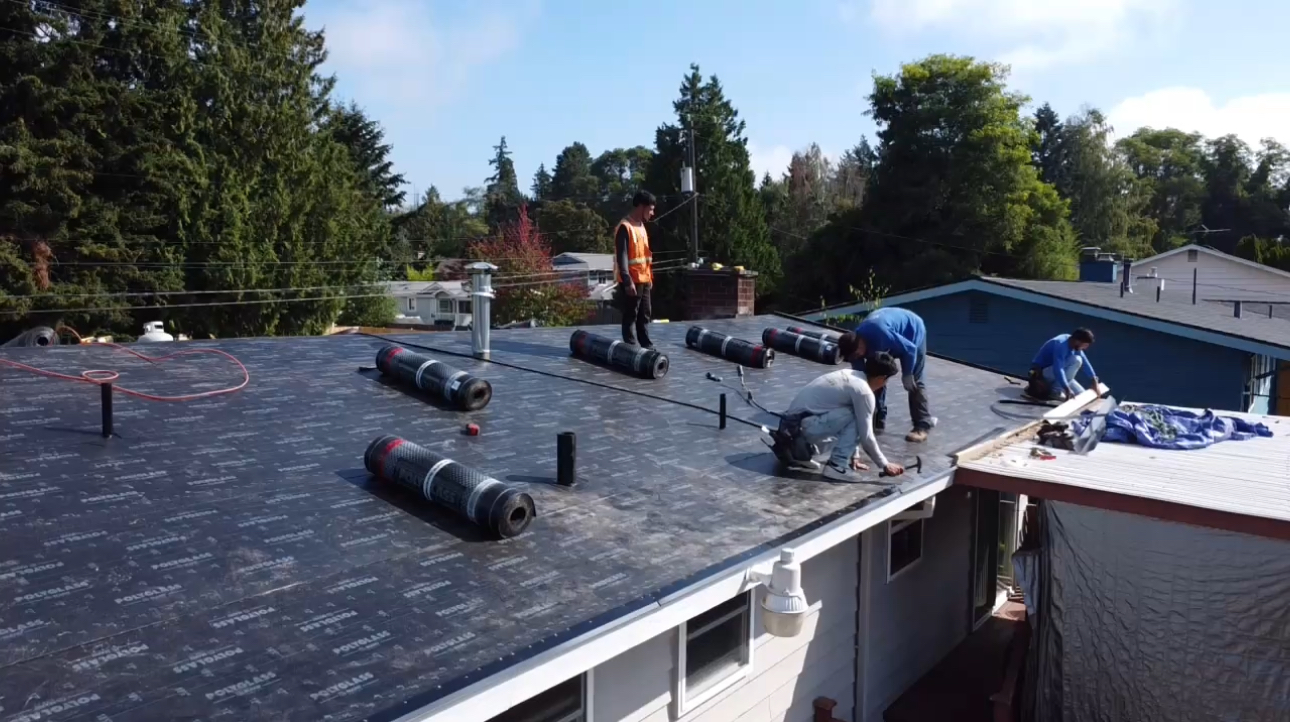
There’s no denying that a roof replacement or installation is an important yet costly undertaking. The good news is reputable roofing contractors offer roofing warranties to protect your investment and give you some much-needed peace of mind. Since warranties may be confusing at first glance, here’s a closer look at what they are and what to look for when you’re exploring various options.
Why Are Roofing Warranties Important?
Even if you choose a highly skilled and experienced contractor and/or top-of-the-line roofing material, something may go wrong with your roof. That’s where roofing warranties come in. When your roof replacement is backed by a warranty, you can mitigate roof risks and in turn, protect the exterior and interior of your home. Without a roofing warranty, you put your property (and loved ones) at risk, especially if you don’t have the thousands of dollars it might take to repair an issue. If you come across a contractor that doesn’t offer warranties, continue your search, as this is a huge red flag.
Three Types of Roof Warranties
1. Manufacturers’ Warranties
When you decide to move forward with a roof replacement or roof installation, it should be covered by the manufacturer’s warranty. In some cases, the contractor will provide you with the details, but sometimes, you’ll have to go to the manufacturer’s website for further information. Put simply, manufacturer warranties protect your roofing materials from defects and failures.
If you splurge on a higher-end roofing material, the manufacturer’s warranty may last longer. However, on average, manufacturer warranties fall in the 5 to 30-year range. Note that these contracts won’t apply if your roof isn’t installed or maintained properly. Also, they don’t usually cover damage from severe weather conditions.
2. Contractor and Installation Warranties
Typically offered by roofers or contractors directly, installation warranties focus on craftsmanship and tend to provide more protection than manufacturer warranties. The caveat, however, is that they can vary significantly and depend on who is providing it.
For this reason, you should clarify the specifics of the contractor with your roofer or contractor. Ideally, they’d outline the coverage in your quote, contract, or agreement. If you notice a roofing issue that was the result of an installation flaw, you should be able to resolve it through your installation warranty.
Keep in mind that it’s not uncommon for roofers to offer limited guarantees on their workmanship, meaning if you hire another contractor to maintain or repair your roof, the warranty will no longer be valid. Installation warranties usually last for five to 10 years. Some contractors go the extra mile and guarantee their work for 25 or even 30 or 40 years, especially if you opted for a higher-end roof.
3. Extended Manufacturer Warranties
Extended manufacturer warranties are created for homeowners who are longing for additional peace of mind. Compared to standard manufacturer warranties, these contracts offer more robust coverage and cost more. Depending on the extended warranty you choose, you may enjoy coverage for both roofing materials and installation for 50 years.
If you’re interested in an extended warranty, be sure to ask your roofer or contractor if it’s an option. In many cases, these contracts are only offered by certified contractors who have met certain requirements imposed by the manufacturer. Also, while extended warranties are comprehensive, they don’t cover everything. For example, if your roof sustains damage from a severe hailstorm, your extended warranty won’t necessarily apply. The exception is if you specifically ask the manufacturer to include it in your coverage.

How to Protect Your Roof Warranties
Fortunately, there are several strategies that can help you choose the right roofing warranties and take full advantage of them. These include:
- Read the Fine Print: Roof warranties can be confusing. That’s why it’s your responsibility to read your warranty contract thoroughly. If something doesn’t make sense, reach out to your contractor or the manufacturer for clarity. Also, make sure you understand coverage exclusions and limitations. Otherwise, you may be on the hook for surprise expenses you didn’t anticipate.
- Register the Warranties: Typically, you’ll need to register a manufacturer’s warranty within a certain time period to activate it. If you disregard this step, you may not have coverage when you need it. Most manufacturers let you register your warranty online or via phone.
- Continue to Work with the Same Roofer: If you hire another contractor to maintain or repair your roof, you may void your installation warranty, as contractors don’t want to guarantee the work of others. Once you find a reputable roofer you like, commit to their services for all your roofing needs.
- Don’t Forgo Inspections: Most warranties require regular roof inspections, usually every two years or so. This way, professionals can spot issues early on before they become more expensive and complicated to fix. If your warranty has this stipulation, make sure to follow through with it.
In Need of an Experienced Seattle Roofer? Schedule Your FREE Estimate With K Single Corp Today
K Single Corp is so confident in the quality of our work that we offer a generous 10-year labor and material warranty, providing you with a great deal of peace of mind if you choose us for your roof investment. For more information, we encourage you to schedule a FREE estimate today. We’re a premier roofing company in Seattle, and we can’t wait to hear from you.
How to Assess Roofing Lifespan: Factors That Affect Durability
How to Assess Roofing Lifespan: Factors That Affect Durability
By K Single Corp Roofing & General Contractor
While you may not think about it often, your roof is one of the most important components of your home. After all, it protects it from the elements and keeps your interior dry, creating a safe, comfortable environment for your family and guests. Your roof also plays a pivotal role in insulating your home to keep it warm in the winter and cool in the summer months. So, how long will your roof last? It depends on a number of factors, all of which we’ll explore below.
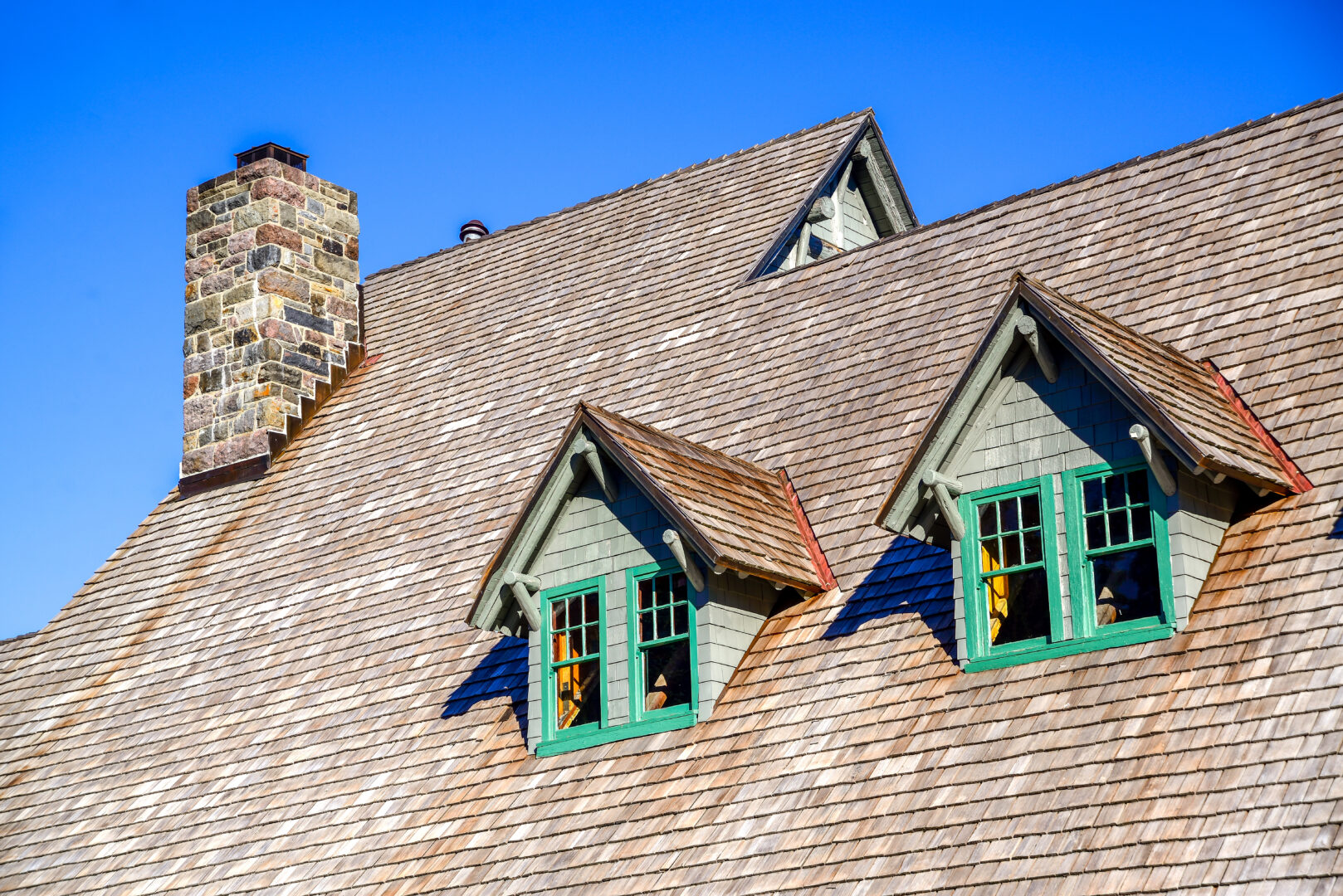
1. Roof Materials
When it comes to roofing materials, there is no shortage of options. Asphalt shingles, which are the most popular and affordable, usually last 20 to 25 years. Tile, concrete, and slate roofs are less common and more expensive but tend to last the longest. You may be surprised to learn that with proper care and maintenance, these roofs continue to do their jobs well for 50 to 100 years.
Metal roofs, which have increased in popularity, also offer long lifespans of more than 50 years. Perhaps the least durable roofing material is wood as it usually only lasts for up to 20 years and isn’t feasible in some weather conditions. Before you commit to a new roof, ask your contractor for an estimate of its lifespan. You may also find this information in the manufacturer’s warranty.
2. Installation Quality
Who installs your roof can mean the difference between a long-lasting roof and a problematic roof that requires frequent repairs and a sooner replacement. When you decide you’re ready for a new roof, be sure to shop around and compare contractors. Opt for a reputable company with excellent references, many positive reviews, and high ratings on third-party review sites.
Choosing a less experienced or cheaper roofer who takes shortcuts during the installation process can actually cost you in the long run. A seasoned roofing contractor who uses the highest quality equipment and most advanced techniques is essential if you want to increase the lifespan of your investment.
3. Roof Pitch
The slope or pitch of your roof may also contribute to its longevity. If you have a flat roof or one with a small slope, you may notice deterioration sooner as a result of slow water movement. Since you can’t necessarily change the structure of your home, a reputable roofer will recommend the most durable roof material for your unique property to help prevent your roof from this issue.
4. Your Location
The local climate and environmental conditions where you live also play a crucial role in determining your roof’s longevity. For example, in regions like Seattle with fluctuating temperatures and heavy rainfall, roofing materials may expand and contract, potentially leading to warping and cracks. Frequent storms can loosen roof membranes and deteriorate flashing over time.
Conversely, in areas with extreme sun exposure, UV rays can weaken roofing materials, causing premature aging and fading. Speak to your contractor about materials suited to your specific geographic region; different climates often call for specialized solutions.
5. Maintenance
Investing in a quality roof is just the first step—regular maintenance is essential if you want it to remain in peak condition for as long as possible. While some roofing materials require minimal upkeep, most need periodic inspections to detect and resolve issues early.
Schedule annual roof inspections with a professional, monitor for damaged shingles, and promptly clean gutters to avoid blockages. Regularly removing debris and trimming overhanging branches can help prevent damage caused by environmental factors. Ultimately, ongoing maintenance helps preserve the integrity of your roof and avoids costly repairs.
6. Ventilation
When your roof is ventilated properly, it will regulate the temperature in your attic and reduce the risk of issues, such as mold and wood rot. Adequate ventilation can also prevent your roof from overheating and premature aging. Consult with a skilled roofing contractor to ensure your roof’s ventilation is in a good spot.
7. Storm and Impact Resistance
Natural disasters like hailstorms, hurricanes, or falling debris can significantly shorten your roof’s lifespan if it is not built with impact-resistant materials. Many modern roofing products are rated for their ability to withstand such events, so it’s worth prioritizing impact-resistant options if you live in areas where extreme weather is common. Look for materials with high durability ratings or certifications for hail and wind resistance.
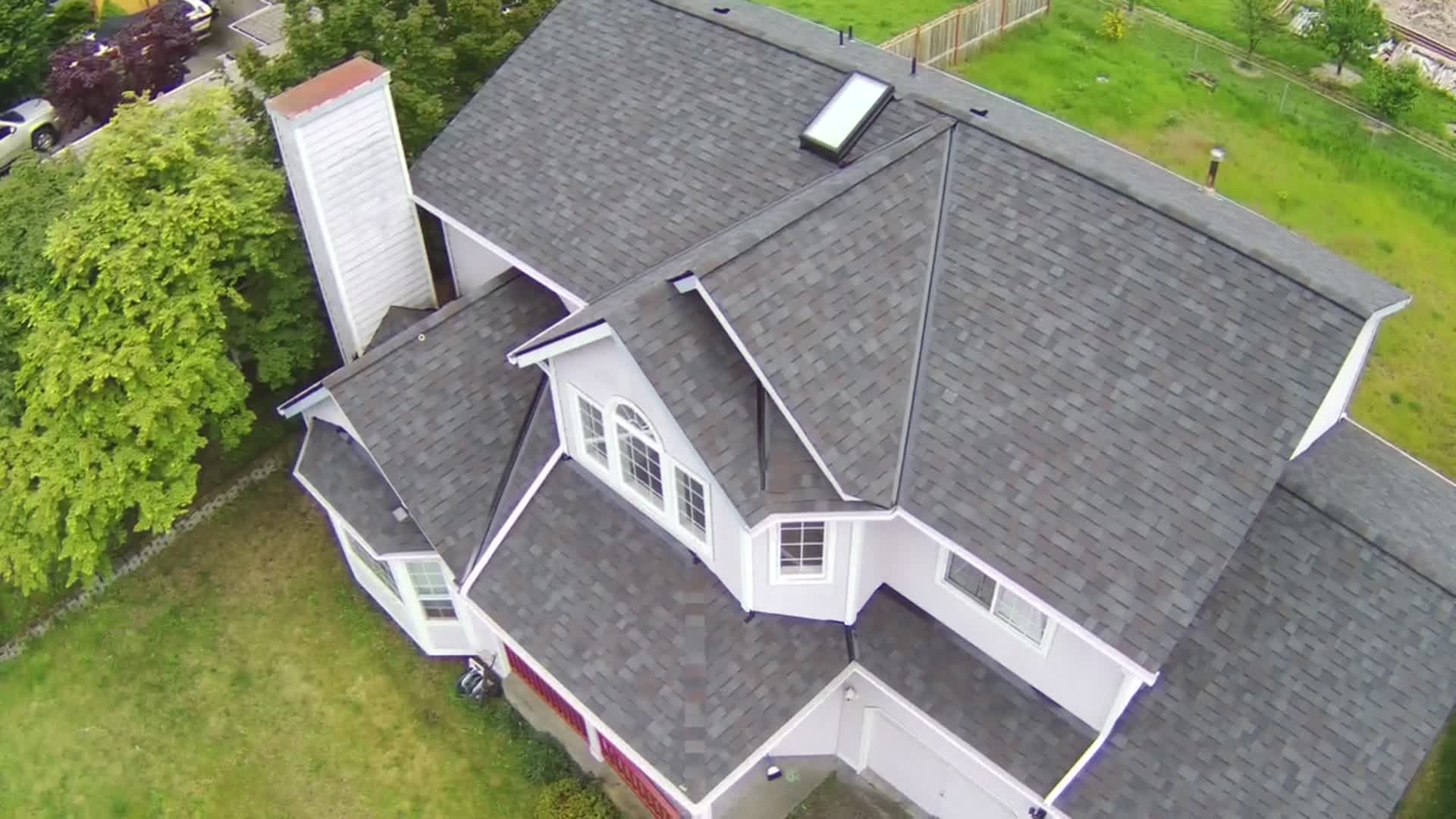
6 Ways to Extend Your Roof’s Lifespan
Here are some strategies that can allow you to increase the longevity of your roof and avoid a replacement for as long as possible.
- Clean Your Roof: Even though your roof may not be as visible as your windows or siding, it could benefit from an occasional cleaning. You can hire a roofer to clear your roof of debris and prevent the growth of algae and mildew. As an added bonus, a clean roof is going to boost your curb appeal.
- Fix Damaged Shingles: If you see damage or missing shingles, reach out to your roofing contractor for a resolution. Ignoring faulty shingles can lead to water leaks and mold while compromising the integrity of your roof. Note that while one or a few damaged shingles may be repaired, too many of them might warrant a replacement.
- Trim Surrounding Trees: Do you live in an area with lots of trees? If so, be mindful of where they are in relation to your roof. If they hang over your roof, it’s time to trim them. Even though you’ll likely need to invest in a tree trimming service, you may add years to your roof.
- Regular Roof Inspections: Schedule inspections with a professional roofer at least once or twice a year. These evaluations help catch small issues—like loose flashing or cracks—before they escalate into more expensive problems. They can also give you peace of mind knowing your roof is in good condition.
- Improve Attic Ventilation: A poorly ventilated attic can trap heat and moisture, which can damage your roof from the inside out. Ensure your attic is properly ventilated to regulate temperature and reduce humidity, extending the life of your roof and protecting its integrity.
- Install Gutter Guards: Clogged gutters can back up water onto your roof, leading to rot and leaks. Gutter guards prevent blockages by keeping debris out of your gutters. This helps rainwater flow freely, reducing the risk of water-related roof damage.
In Need of an Experienced Seattle Roofer? Schedule Your FREE Estimate With K Single Corp Today
At K Single Corp, our goal is to provide Seattle area homeowners with top-notch roofing services, increasing the longevity of one of the most crucial components of their home. Once you schedule a FREE estimate, we can come up with a game plan for how to increase the lifespan of your roof. We look forward to hearing from you!
Choosing Between Roof Repair and Replacement | What You Need to Know
Choosing Between Roof Repair and Replacement | What You Need to Know
By K Single Corp Roofing & General Contractor
In a perfect world, your roof would always be in perfect shape. However, at some point in time, you may notice issues with your roof that warrant either a roof repair or replacement. So, how do you know whether you could get away with a repair or require a full-blown replacement? It all depends on a number of factors, such as the problem at hand, the condition of your roof, your budget, and more. Keep reading to find out how to choose between a roof repair and a roof replacement.
Roof Repairs
A roof repair is exactly what it sounds like: It requires fixing parts of the roof, such as holes, missing shingles, ventilation, or flashing. With a roof repair, a contractor doesn’t have to remove and replace the roof from your home. Instead, they can work on a small portion of your roof and tackle an isolated issue. Compared to a roof replacement, a roof repair is a relatively minor undertaking that may increase your roof’s lifespan.
Therefore, roof repairs are usually quicker and more affordable ranging from $150 for small issues to $8,000 for more extensive ones. The main downside is that some repairs might prolong the need for more extensive repairs or complete replacements. Depending on the situation, it may leave underlying roofing problems in your roof. Also, if your issue is related to shingles, it can be a challenge to match new shingles to the color of your existing ones.
Roof Replacements
During a roof replacement, a contractor removes your existing roofing system and installs a new one. This is usually a multiple-day project that requires a great deal of specialized experience, cutting-edge equipment, and advanced techniques. As long as your roof gets installed by a professional roofer and you maintain it properly, it may last 20 to 25 years or even longer.
While a roof replacement can leave you with a brand-new roof that brings your home up to code and does wonders for your curb appeal, it doesn’t come cheap. To fully replace your roof, you may pay anywhere from $5,000 to $25,000 or even more. The cost will depend on several factors, such as the size of your roof, the materials you choose, and the contractor you hire.
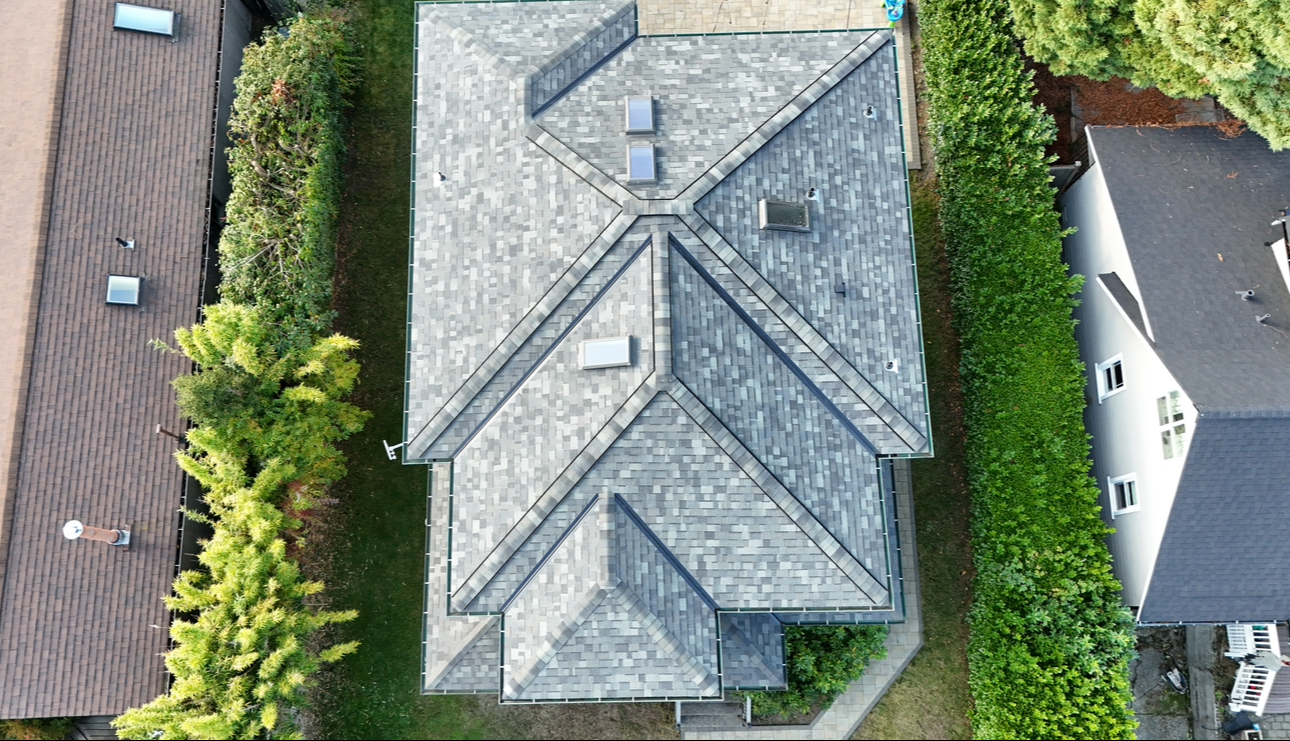
How to Decide Whether to Repair or Replace Your Roof
These factors can help you zero in on whether you’d be better off with a roof repair or roof replacement.
1. The Age of Your Roof
Most roofs have a relatively long lifespan of 20 years or even up to 50 years. If your roof is fairly new, a repair may be sufficient, especially if the issue is minor. However, if your roof is past its prime and you’re looking for a more permanent solution, a roof replacement may be worth the extra money. Fortunately, you’ll get a warranty that can protect it from material and installation-related damage.
2. The Extent of the Damage
If you’re missing a shingle and everything else looks good, you may simply repair your roof. However, a leaky roof might warrant a replacement as it can compromise the integrity of your home and increase the risk of mold and mildew growth. Other signs that might indicate your roof needs to be replaced include a sagging roof, an unexplained increase in energy bills, and recurring repairs that have already cost you a lot of money.
3. Your Long-Term Plans
Are you in your forever home or do you have plans to move in the near future? If you know you’ll move soon, a roof repair may work. However, keep in mind that if your roof has many issues that require multiple repairs, you might have trouble selling your home. A roof replacement is likely worthwhile if you plan on living in your home for a while and/or want to increase your home value and improve your curb appeal.
4. Your Budget
While a roof replacement may be a better option, finances might steer you toward repairing your roof instead. Note that if you do want to replace your roof, you may work with your contractor or third-party financing company to come up with a payment plan that aligns with your budget. Also, since your roof is one of the most important components in your home, saving up for a replacement may be better than dealing with constant issues and repairs. Additionally, you may be able to get away with a partial replacement and save on an entire replacement.
5. Warranty Coverage
Roofs typically come with warranties, such as manufacturer warranties, contractor or installation warranties, and/or extended warranties. Before you determine whether to repair or replace your roof, consider which warranties are in effect. If your roof is still covered by a warranty, the manufacturer or your roofer can help you decide which route to take.
Wondering Whether to Repair or Replace Your Roof? Schedule Your FREE Estimate With K Single Corp Today
If you’re unsure of whether you should repair or replace your roof, don’t hesitate to schedule a FREE estimate with K Single Corp today, the premier roofing company in Seattle and the surrounding areas. Our roofers can recommend a solution once they evaluate your roof’s condition and the extent of the damage. Allow our decades of expertise to help you make the most informed decision for your roof and property.
Tips for Hiring a Reliable Roofing Contractor
Tips for Hiring a Reliable Roofing Contractor
By K Single Corp Roofing & General Contractor

If you’re in search of a roofing contractor in the Seattle Metro area, there are plenty of options at your disposal. However, not all roofers are created equal. In fact, you’ll find that there are significant differences between many of them.
Since your roof is one of the most important and expensive parts of your home, who you choose to inspect, repair, or install it matters. Here are our top tips to help you zero in on a reliable roofing contractor that gets the job done right, on time and on budget.
1. Read Reviews
It’s all too easy for an individual or company to say they’re best. However, real reviews from current and former customers are far more telling. Before you commit to a roofer, be sure to do your research and check out reviews on third-party review sites, such as TrustPilot and the Better Business Bureau (BBB). While a few negative reviews are no big deal, many of them can be a red flag, especially if they revolve around the same issues. The way a roofer responds to reviews is important as well.
2. Ensure the Roofer is Licensed, Bonded, and Insured
A quality Seattle Area roofing contractor should be licensed, bonded, and insured in Washington. All three of these credentials prove that a roofer is serious about their job. They also indicate a sense of professionalism and financial stability. Plus you’ll be protected legally if an unforeseen incident occurs and things don’t go as planned. Don’t be afraid to ask a roofer for proof they’re licensed, bonded, and insured.
3. Only Consider Local Roofers
When you look for a contractor, you may find roofing companies or individual roofers who are located in a different state. To ensure the professional you choose is aware of the local codes, paperwork, and regulations in your area, confirm that they have a local phone number and physical office near you. A local roofer is also a good idea in the event you need to find them after a problem. Prioritizing local pros can also help you avoid companies who are simply trying to take advantage of you after a storm like the bomb cyclone that hit our area in November 2024.
4. Ask Your Network for Recommendations
Chances are your friends, family members, co-workers, and neighbors have worked with a roofer they liked (or didn’t like). Leverage your network and ask for personal recommendations. This can help you narrow down your search and give you the confidence of knowing you’re considering a trustworthy professional with a good reputation in your local area. Don’t be afraid to request recommendations on social media or a local community group.
5. Pay Attention to Warranties
There’s no denying that your roof is a significant, important investment. For this reason, be sure to inquire about a roofer’s warranty. If they don’t have one, run the other direction. If they do offer a warranty, make sure it’s substantial. A reputable roofing company should offer a workmanship warranty for at least 10 years. Keep in mind that even if a roofer promotes their warranty, you should still do your research and read reviews to determine if they do high quality work.
6. Inquire About Manufacturer Certifications
You can think of manufacturer certifications as badges of honor for roofing contractors. While each manufacturer has their own certification criteria, most of them require proof of an excellent reputation and state licensing requirements. Keep in mind that although certifications from manufacturers aren’t legally required, they can make the difference between an average roofer and an exceptional one who will go
7. Prioritize Experience
Roofing is not a skill someone can learn overnight. In fact, it takes years and years of training and experience to be able to inspect, repair, and install roofs properly. Even though a newbie roofing professional may be more affordable, hiring them may compromise the quality of your roof. If possible, choose a roofer or roofing company who has a lot of experience in the industry. Bonus points if they’ve been in your area for years or decades.
8. Review Work Samples
Most reputable roofers will be happy to show you their work through pictures of previous roofing projects they’ve completed. Be sure to take a close look at these images as they can give you an idea of the quality of a roofing professional’s work as well as their attention to detail. Some roofers will advertise their pictures on their websites and social media pages while others will require you to ask for them.
Looking for a Reputable Seattle Area Roofer? Schedule Your FREE Estimate With K Single Corp Today
If you’re in the market for a highly skilled and experienced Seattle roofing company, K Single Corp has you covered. With more than 25 years of experience, we’ve completed over 15,000 roofing and siding jobs, all backed by a 10-year warranty. Contact us today for a free estimate and further details regarding our company and roofing services. We look forward to hearing from you!

